Finding cheap accommodation is a key part of saving money when travelling solo. Accommodation is one of the most expensive aspects of solo travel, but you can save some money using these tips.
Latest update: 2 July 2019
Note: this blog post uses insights from my free ebook “The Insider’s Guide to Solo Travel on a Budget“.
Disclaimer: this post may contain affiliate links, meaning that, at no extra cost to you, I will make a small amount of money if you purchase something through one of these links. Thanks for supporting Ars Currendi!

This is my first blog post in a series of posts about cheap solo travel. The second post focuses on cheap transport and the third post focuses on cheap food and drink.
I decided to create this series to help you travel by yourself and have the time of your life for less money, using tips and insights I’ve gained on my solo trips and telling you things I wish I had known when I started travelling alone.
Why finding cheap accommodation is so important
There are too many people that still don’t sleep anywhere else than in a hotel when they travel. I want to change that. It’s easy to find a place to sleep that is not only cheaper, but also charming and entertaining.
Nowadays, most hostels and other cheap solutions have the same features as hotels, if not even more. If you are able to save money on your accommodation, that means you can splurge on other parts of your trip. In other words, cheap accommodation will help you have the holiday of your life, without having you worried about spending too much. Isn’t that what we’re all looking for in the end?
Tourists and travellers often don’t want to spend the time trying to find a cheap place to sleep, and they end up paying too much for their accommodation. I can assure you that it’s worth it to take some time and research cheap accommodation options so that you find one you’re happy with.
Ways to save money on accommodation
There are many ways to save money on the road. One of those is to choose a cheaper alternative for the ever-popular hotel, which can run down your budget rather quickly. Here, I’ll list some options.
Hostels
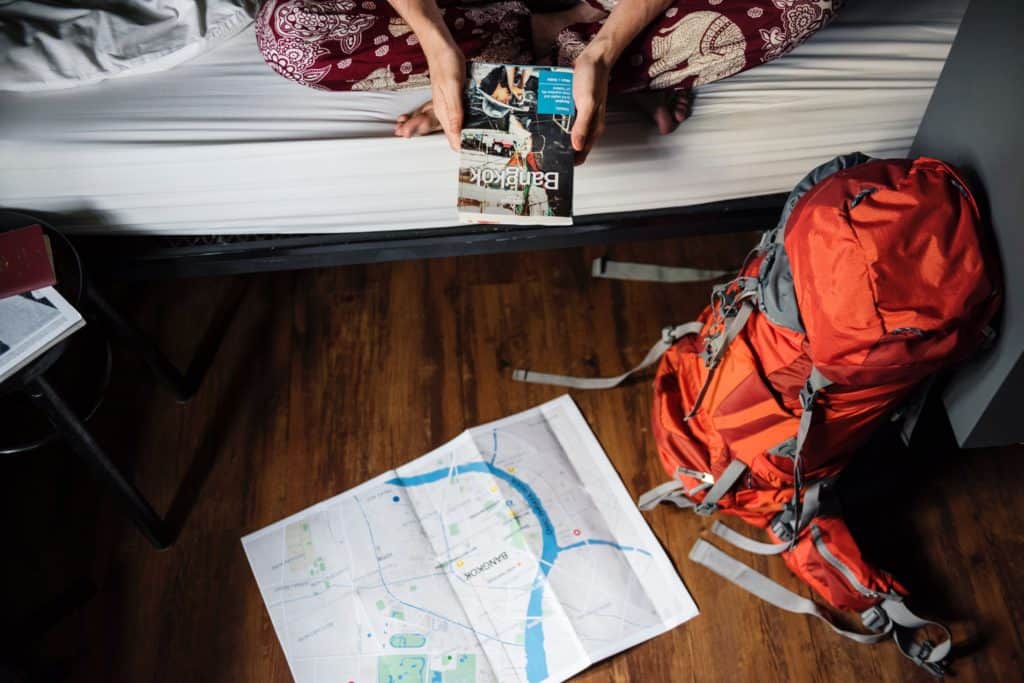
For budget solo travellers, hostels seem to be the most popular accommodation choice. There are a number of very good reasons why hostels are so popular.
First off, though, some explanation as to what a hostel actually is, in case you didn’t know. A hostel is a type of accommodation mainly aimed at young travellers (18-30 years old). The cheapest, most common option in a hostel is a bunk bed in a mixed dorm room. That means that you’ll be sharing your bedroom, bathroom and kitchen with strangers. It can seem daunting, but you get to spend time with some cool people and even make new friends!
Hostels have different sizes of dorm rooms (the bigger the room, the cheaper the bed). Most hostels even have private rooms if you’re not comfortable sharing a room with people you don’t know. These private rooms are usually more expensive than a bed in a dorm room, but still cheaper than hotels.
Nowadays, there are still many people who believe hostels are dirty, unreliable places and they don’t want to spend any time there. However, in reality, most hostels are as clean and trustworthy as any hotel (and they’re cheaper!)
My favourite website to book hostels is Hostelworld.
Airbnb
If you’re familiar with vacation rentals, you’ve probably heard of Airbnb. Just in case you haven’t: Airbnb is a website where people can rent their apartments, rooms or even separate beds for a short amount of time.
Tip: if you’re new to Airbnb, sign up through this link and you’ll receive €35/$43/£31 worth of travel credit!
Airbnb prices are usually something like a fancy hostel or a cheap hotel. That makes it a great option if you’re travelling with your SO, with friends or with family. However, you can still find great deals as a solo traveller. For example, I found a bed in a shared room in Malta for €20 a night. The people hosting this room were renting out separate beds in their own house, while they lived there as well. They managed to create an international hostel, right in their own house. Those people ended up being one of the best parts of my trip to Malta.
Couchsurfing

Couchsurfing is a “service that connects members to a global community of travelers”. At least, that’s what they define themselves as on their website.
In short, that means that you’re staying with somebody without paying rent. It’s free. The catch? You’re sleeping in somebody’s home, and you might not get along with them.
If you’re thinking “that’s a small catch for free accommodation!”, you’re absolutely right and I agree with you 100%. If you’re couchsurfing, you get to stay with somebody who knows the ins and outs of your destination. You can talk to them and you can become friends if you have a lot in common. They might even show you around and take you to the places only insiders know about.
Of course, there’s always the concern of safety in situations like these. However, the company takes many measures to ensure that their travellers (solo travellers in particular) are safe. Most CS hosts were first-time surfers at one point, and they started hosting to give back to the community (read: you). They’ll try their very hardest to make you feel safe and at home while you’re there.
The website also has safety precautions. For example, you can check if your potential host has a picture attached to their profile and if they have confirmed government documents. The reference system is probably the best guideline for a safe host: if they have positive reviews from other surfers, it’s almost sure that you’ll be safe and have a good time as well.
There’s only one thing better than cheap accommodation, and it’s free accommodation.
Volunteering
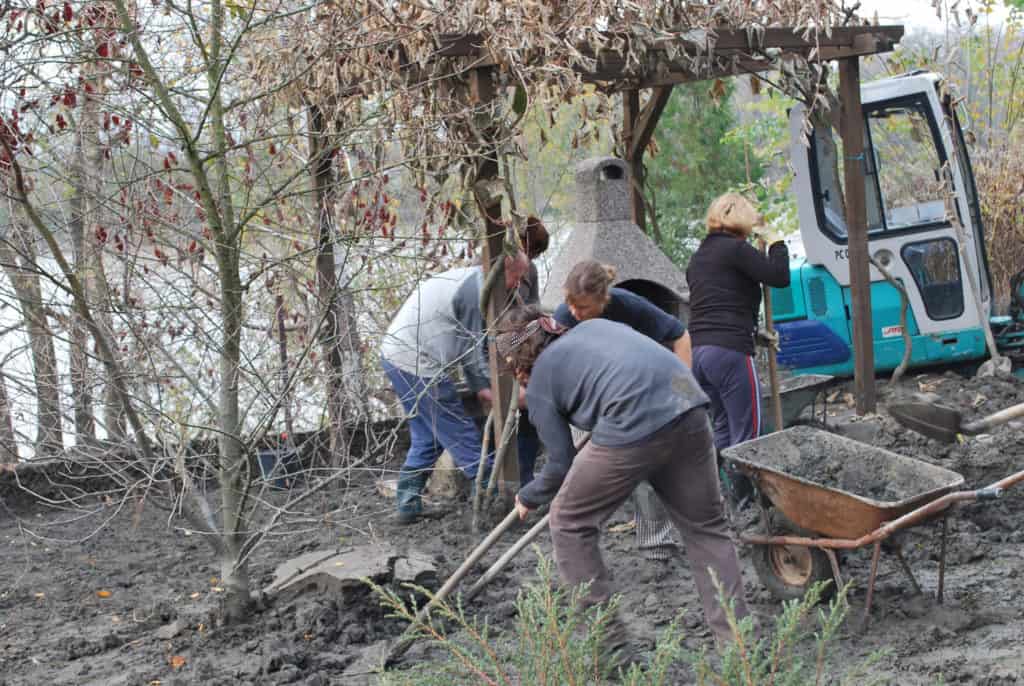
The next option for cheap accommodation (free, technically) is volunteering. This has become increasingly popular over the last years, especially with young solo travellers.
Note: this is not about volunteering for an organisation and paying for it. This is about spending time abroad and helping out a local community in exchange for (food and) a place to sleep.
Some great websites to find a volunteering job abroad are WorkAway, WWOOF, AuPairWorld and FindAuPair.
Websites like WorkAway and WWOOF introduce possibilities for travellers to work for a host and they reward you with free accommodation. These hosts include farms, schools, NGOs and other local projects. This means that you’ll really be submerged in a foreign culture, so it’s a great way to find out more about the rest of the world. There are often short-term positions available.
Working as an au pair means that you’re essentially a nanny. It’s usually much more of a commitment than the aforementioned possibilities. An au pair is usually a young person (between 18 and 30) who lives with a host family for a certain amount of time and cares for the children. The biggest difference is that you actually get paid as an au pair (minimum monthly wages range between $100 and $500) on top of getting free accommodation.
Overnight transport
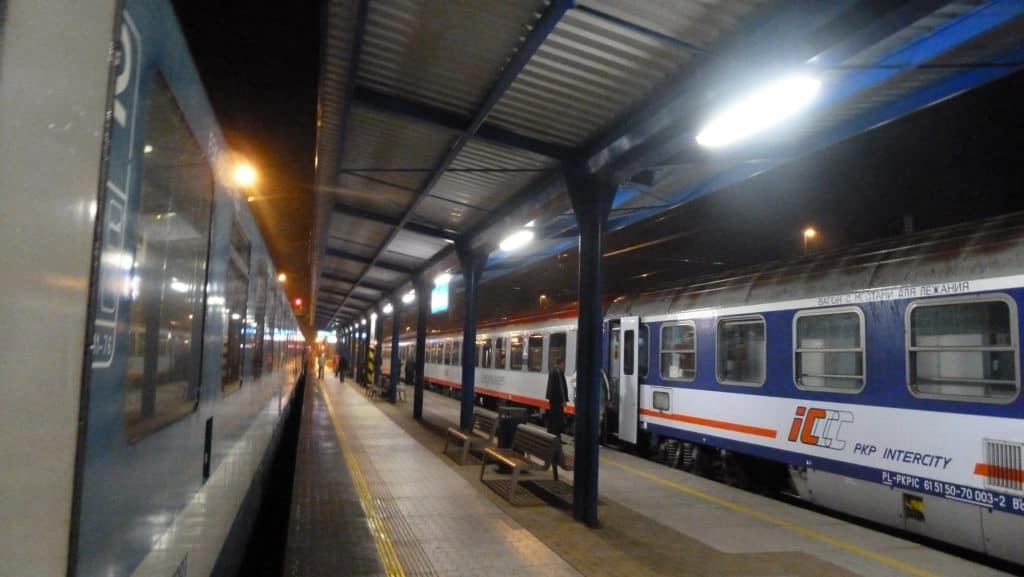
Okay, yes. An overnight bus, train, boat or flight might be a bit more expensive than its equivalent in the daytime. However, you’re essentially getting a place to sleep for free. And while it might not be the most comfortable, you’re getting cheap accommodation, aren’t you?
With an eye mask, earplugs and a neck pillow, your quality of sleep might not be so bad. More importantly, you’re saving quite some money on your accommodation budget. That’s money that you get to spend elsewhere!
House sitting
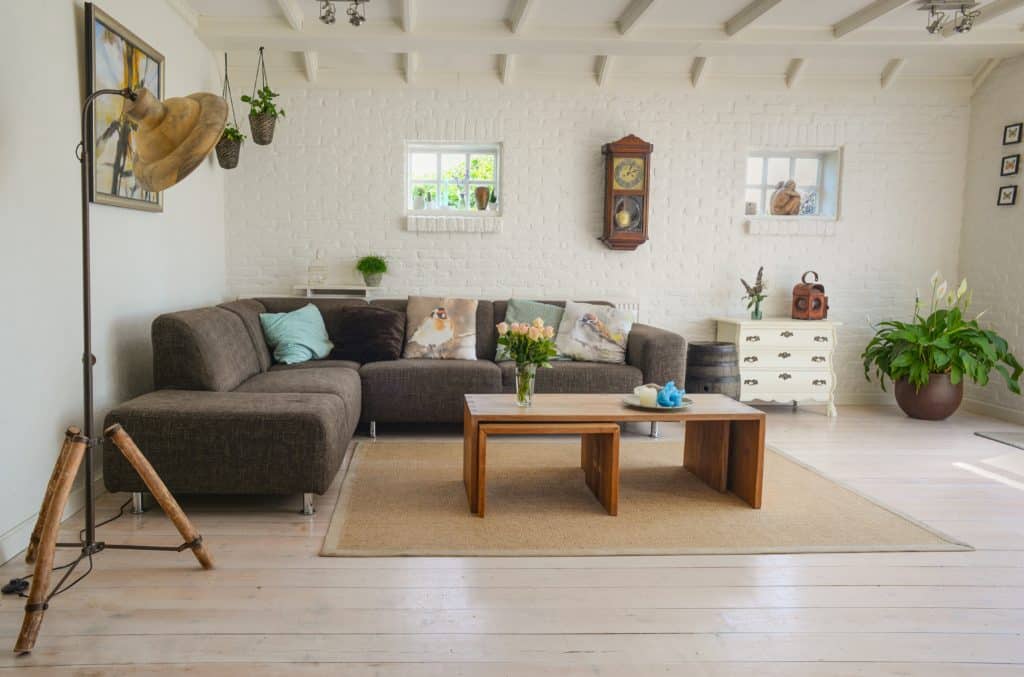
House sitting is on the rise. And even if you’ve never actually done it, you probably know of someone who has. Think about it. If somebody leaves for two weeks to go on holiday and they don’t want to leave their house, pets and plants alone, they ask someone to look after that. If you’re lucky, you might get to do that in exchange for free accommodation!
The thing is, the market for house sitters is rather saturated and there’s a lot of competition. There are way more hosts than sitters. One way you can get ahead of others is to join a house-sitting Facebook group like House Sitting Cafe or House Sitting World.
There are also websites dedicated to helping hosts find someone to take care of their house while they’re gone, such as TrustedHousesitters, Nomador, House Sitting World and HouseSitMatch.
How to avoid the single supplement
If you’re a seasoned solo traveller, you know the toughest part of finding cheap accommodation is avoiding the single supplement. In case you’re not so seasoned, here’s what that means.
Hotels, cruises and other similar organisations charge solo travellers with a solo supplement. That’s a premium that is charged to them because they’re taking up a room that could be used by two people. This supplement can take up between 10% and 100% of the original price.
There are some ways to avoid the single supplement, though. And I’m here to teach them to you.
Bunk up!
The best way to guarantee that you won’t be charged with a single supplement is to, well, make sure that you’re not single anymore. You can find like-minded travellers all over the place. That’s especially true when you’re staying in hostels or taking a group tour.
Related: Making friends as a solo traveller
If you find somebody you really like, you can ask them to become your roommate. That way, you’ll both save money and you might even make a new friend.
Negotiate
Can’t find a buddy to bunk up with? No worries. There are still other ways to eliminate or reduce your single supplement.
For example, you can use your diplomatic skills, talk to the operator/vendor and try to convince them to waive the supplement. You can do this in real life, over email, through Twitter, by calling the operator, …
Chances of this working are admittedly slim, but that doesn’t mean you can’t try. After all, you’ve got nothing to lose.
Travel off-season
In the shoulder season, low season or off-season, tours and rooms are less likely to be fully booked. That means that operators might be more desperate to fill up their empty spots, and be more likely to waive the supplement if you ask.
Talk to a travel agent
Travel agents know the ins and outs of the travel business. They know of even more ways to benefit solo travellers. One of those ways is getting cheaper rates by getting rid of the single supplement. Travel agents are paid to help their clients get the cheapest rates, and you should definitely use that expertise to your advantage.
Now, you should definitely be able to find cheap accommodation easily. After reading this blog post, you’ll never overpay for a hotel room again. In the next chapter of this miniseries, I’ll teach you how to find cheap transport (including cheap flights!). The third post will focus on cheap food and drinks.
Better yet, you can grab your free copy of my ebook on cheap solo travel and get even more tips to cut down your costs as a solo traveller.
Share this article if you learned something!
Thanks for reading!
-S
PIN IT!


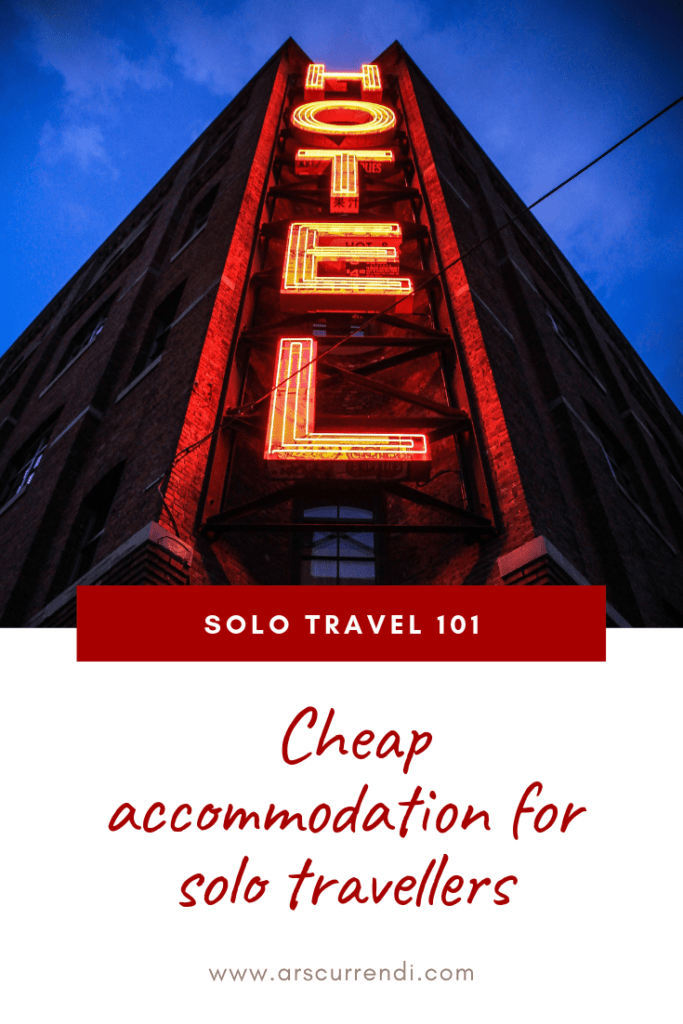
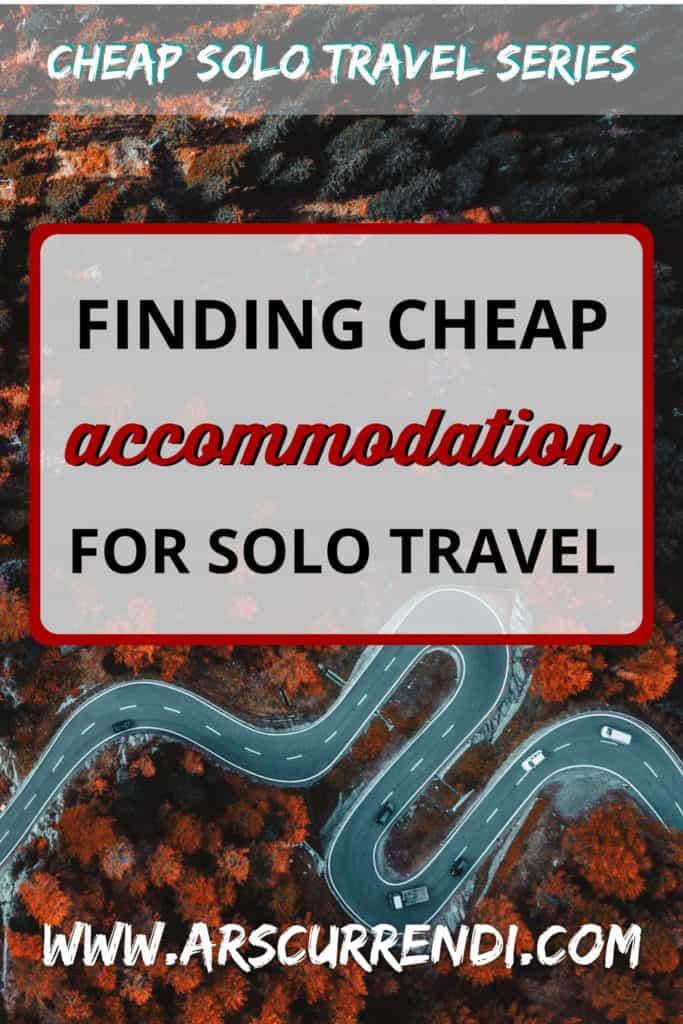





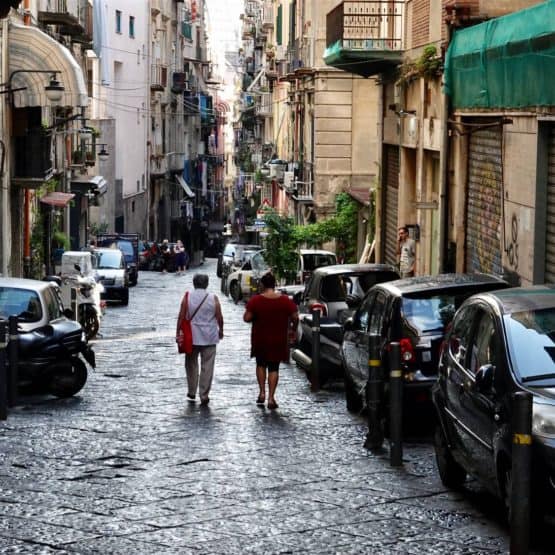

Eric Coleman
April 5, 2018 at 9:26 pmGreat post, Sander! Sharing this on our FB page:D I have never used Couchsurfing or stayed in a hostel, but I have big trip plans next year so I can’t wait to finally experience those!
Have you ever encountered a bad host while couch surfing?
Sander
April 6, 2018 at 5:18 pmHey Eric!
First and foremost, thanks for your comment and for sharing my article!
I’ve had one bad experience with Couchsurfing: I was going to Malta (solo) and I had made contact with a CS host through the website a couple of weeks before. However, two days before I left Belgium, this guy sent me a message to say that he couldn’t host me after all. I had to look for accommodation two days before leaving. (Luckily, I found a cheap bed in an apartment with some amazing people, so it wasn’t that big of a deal in the end). I’m not thrown off by this experience enough to never use Couchsurfing again 😉
Eric Coleman
April 6, 2018 at 9:12 pmThanks for responding! That’s good to know you would still use the program again. At least it wasn’t a situation where he turned out to be terrible once you were already staying at his house!
Sander
April 6, 2018 at 9:29 pmI didn’t actually stay at his house, though. I actually never even heard from the guy who bailed on me again. The bed I found was listed on Airbnb 🙂
Rose Chadwick
May 2, 2018 at 1:56 pmHostels are great idea but for me Airbnb is the best option. Great if you want to check out with the locals and still get your privacy. Thank you for sharing this post.
Sander
May 2, 2018 at 2:33 pmThanks for your comment, Rose! I personally prefer hostels, but I can definitely see why you’d opt for an Airbnb.